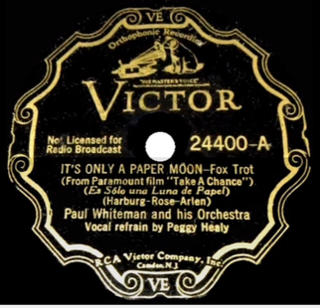Bart Howard was an American composer and songwriter, most notably of the jazz standard "Fly Me to the Moon", which has been performed by Kaye Ballard, Judy Garland, Frank Sinatra, Tony Bennett, Ella Fitzgerald, Nancy Wilson, Della Reese, Bobby Womack, Diana Krall, Paul Anka, June Christy, Brenda Lee, Astrud Gilberto, Nat King Cole, Peggy Lee, and Sia, among others. It is played frequently by jazz and popular musicians around the world. Howard wrote the song for his partner of 58 years, Thomas Fowler.
Gordon Hill Jenkins was an American arranger, composer, and pianist who was influential in popular music in the 1940s and 1950s. Jenkins worked with The Andrews Sisters, Johnny Cash, The Weavers, Frank Sinatra, Louis Armstrong, Judy Garland, Nat King Cole, Billie Holiday, Harry Nilsson, Peggy Lee and Ella Fitzgerald.
"The Man that Got Away" is a torch song, published in 1953 and written for the 1954 version of the film A Star Is Born. The music was written by Harold Arlen, and the lyrics by Ira Gershwin. In 1954, it was nominated for the Academy Award for Best Original Song. In 2004, Judy Garland's performance of the song was selected by the American Film Institute as the eleventh greatest song in American cinema history.
"Where or When" is a show tune from the 1937 Rodgers and Hart musical Babes in Arms. It was first performed by Ray Heatherton and Mitzi Green. That same year, Hal Kemp recorded a popular version. The song also appeared in the film version of Babes in Arms two years later.

"It's Only a Paper Moon" is a popular song published in 1933 with music by Harold Arlen and lyrics by Yip Harburg and Billy Rose.
"But Not for Me" is a popular song originally written by George Gershwin and Ira Gershwin for the musical Girl Crazy (1930).
"I'm Beginning to See the Light" is a popular song and jazz standard, with music written by Duke Ellington, Johnny Hodges, and Harry James and lyrics by Don George and published in 1944.
"Embraceable You" is a jazz standard song with music by George Gershwin and lyrics by Ira Gershwin. The song was written in 1928 for an unpublished operetta named East Is West. It was published in 1930 and included in that year's Broadway musical Girl Crazy, performed by Ginger Rogers in a song and dance routine choreographed by Fred Astaire.
"I've Got The World on a String" is a 1932 popular jazz song composed by Harold Arlen, with lyrics written by Ted Koehler. It was written for the twenty-first edition of the Cotton Club series which opened on October 23, 1932, the first of the Cotton Club Parades.
"Almost Like Being in Love" is a show tune with music by Frederick Loewe and lyrics by Alan Jay Lerner. It was written for the score of their 1947 musical Brigadoon. The song was first sung by David Brooks and Marion Bell, in the Broadway production. It was later performed in the 1954 film version by Gene Kelly.

Here's to the Ladies is an album by Tony Bennett, released in 1995.
"How About Me?" is a popular song written by Irving Berlin in 1928. The song is an expression of sorrow over a love affair that is over. The first recording by Fred Waring's Pennsylvanians was popular in 1928 and the song has subsequently been recorded by many artists.
"Happiness Is a Thing Called Joe" is a song composed by Harold Arlen, with lyrics written by Yip Harburg, it was written for the 1943 film musical Cabin in the Sky, recorded by the MGM Studio Orchestra and sung by Ethel Waters. The song was nominated for the Academy Award for Best Original Song in 1943 but lost out to "You'll Never Know".
"Get Happy" is a song composed by Harold Arlen, with lyrics written by Ted Koehler. It echoes themes of a Christian evangelical revivalist meeting song.
"I Wish I Were in Love Again" is a show tune from the 1937 Rodgers and Hart musical Babes in Arms. In the original show, Dolores, the Sheriff's daughter, talks to Gus, her former boyfriend, who tries to woo her unsuccessfully. They then sing about how they do not care that their relationship is over. The song was omitted from the 1939 film version.
"Do I Love You?" is a 1939 popular song written by Cole Porter, for his musical Du Barry Was a Lady, where it was introduced by Ronald Graham and Ethel Merman.
"You Took Advantage of Me" is a 1928 popular song composed by Richard Rodgers, with lyrics by Lorenz Hart, for the musical Present Arms (1928), where it was introduced by Joyce Barbour and Busby Berkeley as the characters Edna Stevens and Douglas Atwell. The characters were formerly married, but still have romantic feelings for each other. On opening night, Berkeley forgot the lyrics and had to scat and hum the entire second verse. Berkeley also claimed that his nonsense lyrics for the improvised second verse left Hart "almost apoplectic", but the audience was amused and Hart later forgave him. The song was subsequently included in the 1930 film Leathernecking, an adaptation of Present Arms.

Women & Songs: Beginnings is the first of an eventual two releases in the Women & Songs "Beginnings" series.
The following is the discography for big band and traditional pop arranger Nelson Riddle (1921–1985).
"F.D.R. Jones" is a 1938 satirical song written by Harold Rome. It was first recorded and released as a single by Ella Fitzgerald in 1938 and was performed by Judy Garland in blackface in the 1941 musical picture Babes on Broadway. The song satirizes the then contemporaneous practice of African American parents who named their children after Franklin D. Roosevelt, the 32nd President of the United States.



